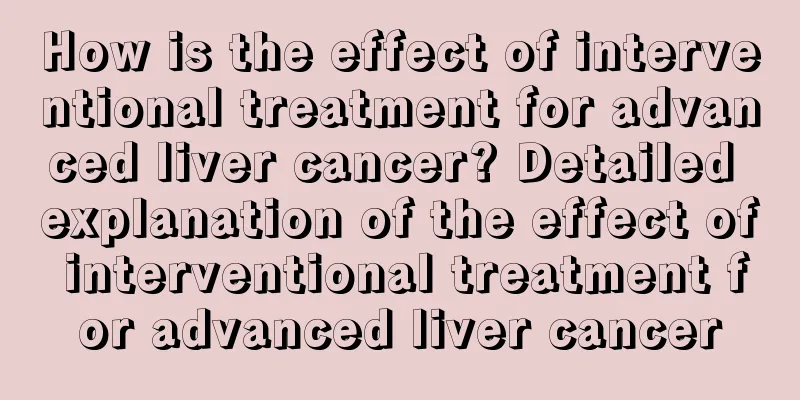How is the effect of interventional treatment for advanced liver cancer? Detailed explanation of the effect of interventional treatment for advanced liver cancer

|
The full name of interventional treatment of liver cancer is interventional treatment of liver cancer. It is a treatment method that does not expose the lesion through surgery. The interventional treatment mainly includes selective hepatic artery perfusion therapy, selective hepatic artery embolization, and selective hepatic artery chemoembolization. Its treatment effect is very good and can prolong the patient's life. The full name of interventional treatment of liver cancer is interventional treatment of liver cancer. It is a treatment method that does not expose the lesion through surgery. It is a minimally invasive treatment method that creates a tiny channel with a diameter of several millimeters on the blood vessels and skin, or through the original channels of the human body to treat the lesion locally under the guidance of imaging equipment. Most liver cancer patients only discover the existence of their own disease in the late stage, usually because the onset of liver cancer is hidden and not easy to be detected. Patients with advanced liver cancer are usually accompanied by symptoms of poor digestive tract. This symptom of liver cancer often accompanies the entire course of liver cancer patients. Generally, there will be a variety of symptoms such as indigestion, loss of appetite, nausea, nausea, abdominal distension, etc., which are easily mistaken for chronic enteritis. In addition, patients are emaciated and weak. In the late stage of liver cancer, there are also symptoms of weight loss and fatigue. It may be due to the disorder of digestive function and stagnation of nutrient absorption, resulting in energy shortage. In severe cases, cachexia occurs and affects health. Malignant cavity effusion is also a common type of patient. Malignant cavity effusion is an important and malignant tumor disease. Symptoms of malignant cavity effusion in the late stage of liver cancer occur if not treated properly. If thoracic metastasis is found: At the same time, this symptom is accompanied by bone or spinal metastasis, and intracranial metastatic cancer may have neurological localization signs. These metastatic symptoms will show corresponding symptoms in the late stage of liver cancer. In the late stage of liver cancer, vascular interventional treatments mainly include selective hepatic artery perfusion therapy, selective hepatic artery embolization, and selective hepatic artery chemoembolization, which have good therapeutic effects and can prolong the patient's life. If TAI treatment is used, the drug is infused into the artery through a catheter at a dose equal to or less than that of intravenous administration. This can increase the local drug concentration in the target cells, prolong the contact time between the drug and the lesion, and reduce the total drug dose in the body, thereby achieving the purpose of improving efficacy and reducing side effects. In addition, patients can also consider a comprehensive treatment system, which is a planned and reasonable application of existing treatment methods based on the patient's physical condition, tumor pathological type, invasion range and development trend, so as to maximize the cure rate and improve the quality of life. |
>>: Is lung cancer contagious? How long can one live with lung cancer?
Recommend
What causes itchy nipples? Beware of these reasons
Itching of the nipple is a symptom. Many women sh...
6 ways to effectively prevent liver cancer Massaging 5 acupoints can also help prevent liver cancer
How to prevent liver cancer has always been a con...
Can air pollution cause laryngeal cancer?
Nowadays, laryngeal cancer is a very serious dise...
Causes of laryngeal cancer
Laryngeal cancer is a common malignant tumor in t...
Does blushing after drinking alcohol increase the risk of liver cancer? To prevent liver cancer, don't eat these four things
Lifestyle and environmental pollution are closely...
Wide-set eyes
There is a saying in physiognomy: Eyes account fo...
Why is there blood in the stool?
The normal color of human stool is yellow. If the...
Is dry cough caused by tuberculosis?
In medicine, the most obvious clinical manifestat...
What are the common symptoms of cardia cancer?
Cardiac cancer is a common adenocarcinoma, mainly...
What to do if platelet count is 0
A platelet count of 0 can be said to be a particu...
10 ways to massage your ears to strengthen your kidneys and keep fit
Each organ and tissue of the human body has a cor...
What should lung cancer patients pay attention to in their daily diet? Lung cancer patients should pay attention to three points in their diet
In this era of increasing incidence of cancer, ma...
What is the white color on kimchi
Many people don’t know much about the white subst...
How to brush your teeth with baking soda to benefit your dental health
Recently, it has been circulated on the Internet ...
Why does lung cancer always cause fever?
Why does lung cancer always cause fever? Lung can...









